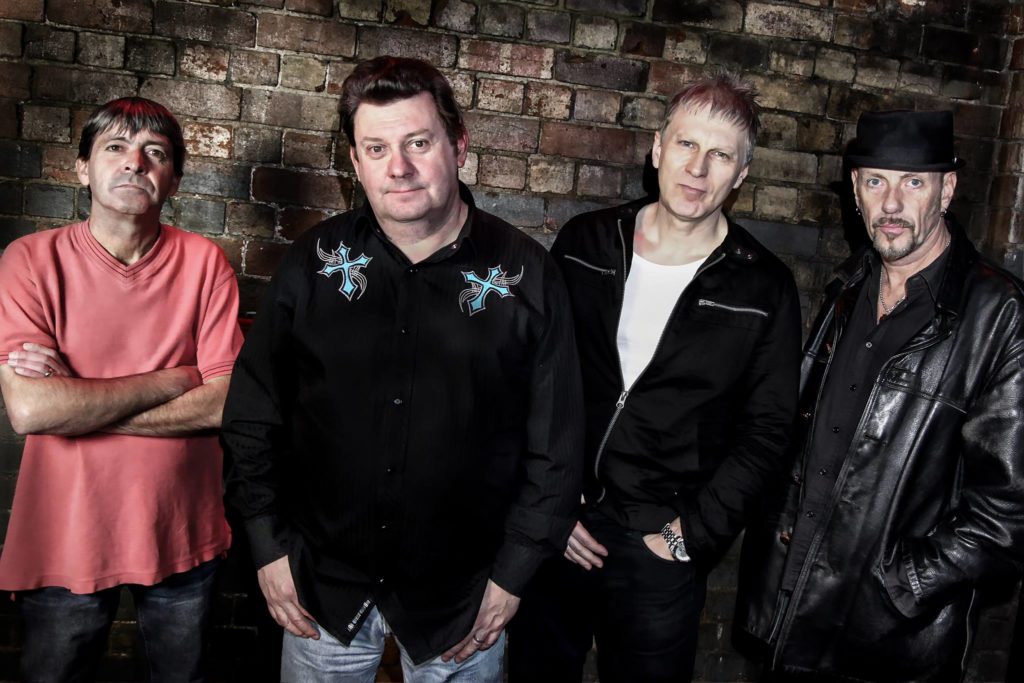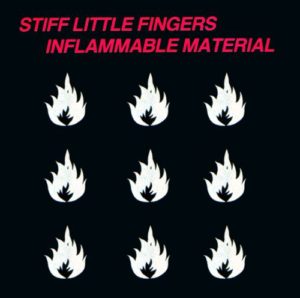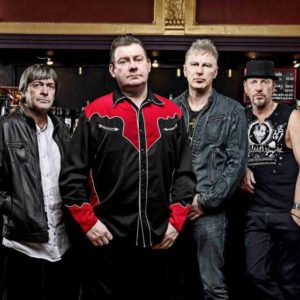
Stiff Little Fingers is bringing their powerfully political songs, infused with the raw enthusiasm of their punk rock roots, and their intensely raw and energetic stage show to Canada for the band’s first ever extensive tour of the country.
Starting with a show at the legendary Horseshoe Tavern in Toronto on Nov. 7, the band, led by vocalist/guitarist/songwriter Jake Burns, will hit both the east and west coasts, as well as stops in Quebec, Manitoba and Alberta before wrapping up at the iconic Rickshaw Theatre in Vancouver on Nov. 29. Stiff Little Fingers are actually playing a second show at venerable Horseshoe, on Friday, Nov. 9. In between, the band will head to London, Ontario for the first time, for an engagement at the London Music Hall Nov. 8.
“We do play all over the world. I am not sure exactly how many shows, but I do seem to be spending a lot of time in airports and in airplanes. This year we started in Australia and we did the U.K. and some German shows, some other festivals in Europe and obviously now we’re heading up to Canada. It’s been two years since we were up there. For most of our career, we only ever really went up there to play Toronto, Vancouver and occasionally a show in Montreal. We were always sort of dancing along the American border and just hit the big cities,” said Burns, who moved to Chicago from Belfast, Northern Ireland more than a dozen years ago to be with his American girlfriend.
“We were discussing places we do play on a regular basis and places we don’t and one of our managers is Canadian and I actually said to him, ‘there’s got to be more place to play than just Toronto , Vancouver and Montreal.’ And he said absolutely there was, there’s tons of places. And I said, ‘well, let’s go get them.’ So that was the thinking a couple of years ago. And I think we came up and did about eight shows that time and it was a lot of fun. Not every show was hugely well attended, but a lot of them were. We were surprised how well most of the shows were attended. We left it off the itinerary last year, but we mentioned possibly going back in 2018 and were pleasantly surprised that there was a lot more interest from promoters this time around. As a consequence of which, we are with you pretty much all of November, and we are very much looking forward to it.”
Burns said he is thrilled to be hitting the highways and byways of the Great White North with their pals, Canadian Irish punk legends, The Mahones.
“They have been friends of ours for a good few years now and we had always talked about doing something together on the road. I have played and sang on one of their records, so we are good pals. When they saw our schedule, and I think they were in Europe at the time, suddenly my phone rang, and it was [Mahones founder and frontman Finny McConnell] saying, ‘we’ve got to do this tour with you.’ And that’s so nice,” he said.
“It’s a nice thing to do. We’re not really looking at them as a support act or an opening act, but a band sharing the bill with us. I think it will be a great show from top to bottom and certainly there will be places on this tour where they will help us draw and hopefully at other times, we can help them out.”
Burns said regardless of where they play, he is amazed to see a broad range of fans enjoying the music of Stiff Little Fingers, which goes back four decades, and getting into the spirit and energy of the show.
“We do have some people who have stuck with us for the entire journey, and then there are younger people, which probably is a generational thing when I come to think of it. When we first started getting younger people, we thought it was probably older brothers and sisters leaving home and leaving their record collections behind and we’re getting picked up through that. And then, obviously bands who came after us started citing us as an influence, people like Green Day and Bad Religion and folk like that, obviously their fans would be that much younger and maybe they are curious about these references and check us out,” he said.
“Which is sort of like when we started, our audience was checking out the likes of Iggy Pop and people like that because we were mentioning them as our influences. So that was part of it, but now we find people who are original fans are now parents and initially they may have dragged their kids along because they couldn’t get a babysitter or whatever but more and more, they are still coming, but now it’s the kids who are actually dragging the parents to see us.

“So, it is a pretty wide spread, age wise. Someone pointed out to me that fans keep sending in photographs of their six and seven year old kids to social media wearing Stiff Little Fingers t-shirts, saying they’re too young to see us but as soon as they are old enough, they will because they are big fans of the records. I guess that means will be playing while I am using my Zimmer frame or walker.”
Stiff Little Fingers was formed in Belfast in 1977 and soon became identified with the Punk movement of the late 1970s, and are considered contemporaries of The Damned, the Sex Pistols and The Clash. This means that for Burns, the definition of what ‘punk’ actually means comes from a place of first-hand history and a unique perspective that most of the modern music industry marketers have no particular knowledge. After the band’s independent debut album Inflammable Material, released in 1979, Stiff Little Fingers has issued nine more albums, up to 2014, as well as a number of anthologies and many live albums.
“To me punk meant the freedom to express yourself and be yourself. And I think that it kind of got lost, like a lot of things, by the fact that it was chewed up by the music industry. It became a label to describe a certain type of music, as opposed to an attitude. To me it was always more of an attitude than a style of music or a style of clothing. When we first started, punk bands were as varied as they could be. There was The Ramones and The Damned and Sex Pistols. But the Talking Heads were considered a punk rock band; Blondie was considered to be a punk band and Elvis Costello was considered punk. And those were widely different types of music and you can throw XTC in there as another example. They were all wildly different from The Ramones, but all sort of have the same attitude in common,” he explained.
“And there was an intelligence to the music on top of the permission to be yourself and do what you wanted to do. It was a freeing thing, as far as I was concerned. And then within probably four years punk came to mean you have to have a certain spiked hairdo, you have to have a leather jacket with the requisite number of studs on it and the right band names on the back of it. And you really weren’t allowed to know four chords. They really kind of started to celebrate the stupidity rather than the intelligence that, to me, represented what punk was about in the first place.
“And that was when it was really done as a genre. But the idea as a way of living, it never changed as far as I was concerned. As a type of music, it got stifled around 1981 or 1982. I would never sort of slag off the newer bands [who adopted the term punk to try and derive some street cred] because they bring a lot of pleasure to a lot of people. But to me, once it had settled into that uniform and settled into that one specific style, it lost a lot of its initial appeal and a lot of the reason I was attracted to it in the first place.”
Burns said that at the time, the early punk bands really didn’t see themselves as breaking new ground or creating a musical movement. They were trying to emulate the early progenitors of rock and roll music, the courageous and cutting edge artists who truly did define a new form of youth-oriented music the mid 1950s.
“I don’t think The Ramones considered themselves to be a punk band initially. To me, they always sounded like a very loud version of the Beach Boys, especially when I first heard them. And I think a lot of us were striving to sound like the original rock and roll bands, without sounding rockabilly-ish. That was the spirit we were aiming for, certainly as far as I was concerned, and it’s what I also heard in a lot of people’s records at the time,” Burns said.
“And somebody like Joe Strummer was obviously influenced by early rock and roll records. I think as much as you’re saying these younger bands are stumbling upon what we did organically, we probably stumbled across the thing originally because we were trying to sound like Eddie Cochran or Little Richard and just didn’t know how to do it.”
Stiff Little Fingers started off as a group of school friends, with three members going to the same school and original bassist Ali McMordie going to a different school but was still pals with Burns and his mates. McMordie rejoined the band in 2006 after leaving the group in 1991. Guitarist Ian McCallum joined the fold in 1993, while Steve Grantly has been the band’s drummer since 1996. Burns is the only member to have been with the group from inception to the present day.
Back in the day, the band was begun as a way to have fun and cover their favourite rock tunes. As soon as they began composing original material was not only when their music became more of what many would see as prototypically punk, but the lyrics began to take on sensitive and pressing political and social subjects – particularly the ongoing conflict in Northern Ireland. Since then, the band has taken lyrical aim at war, social and economic inequality, political corruption, corporate greed and at times more personal subjects, such as depression and other demons that have haunted Burns himself or people he knows.
“At the beginning it was certainly an exercise in letting off steam but not necessarily politically. It was only when we started to write our own material that it started to get political, and even then, it was not something we intentionally set out to do, or even realized we were doing. You know sometimes it takes an outsider to point the obvious out to you. Our first manager was an Englishman and when he heard the first songs that we wrote, and I think those first songs were Breakout and State of Emergency from the first album, he said we were on to something,” Burns explained.
“State of Emergency was very much written about the area and the situation I was growing up in and the manager said I needed to write more songs like that. Breakout was more about my day job, but everybody was writing songs about how bored they were working, so that didn’t really just apply to me. He said that the political struggles and the violence and all that is what affects my daily life more than anything else, so that’s what I should keep writing about. Once somebody outside like that mentioned it, I was like, yeah that really is the thing that has frustrated me more than anything else. And it’s just like somebody lighting the blue touch paper on a firework, suddenly all the sparks came flying out, and it was the most obvious thing in the world to do. From that point on, the music did become a vehicle for myself in particular to vent against the world, if you want to put it that way.”
 Although many of those social ills are as prevalent as they have ever been – worse in many instances – Burns said he didn’t want to get stuck in a creative rut, writing about these subjects from the point of view of an angry young man. In recent years he was worried about becoming derivative of himself and not writing honestly and authentically about the issues that were impacted his life today.
Although many of those social ills are as prevalent as they have ever been – worse in many instances – Burns said he didn’t want to get stuck in a creative rut, writing about these subjects from the point of view of an angry young man. In recent years he was worried about becoming derivative of himself and not writing honestly and authentically about the issues that were impacted his life today.
“With regards to what I actually write about, initially anything that offended my sense of justice or sense of what was correct in the world, that was the sort of thing I would write about. But the subjects have changed over time. For the last album [No Going Back, released in 2014] we put out, I scrapped a whole bunch of songs because they seemed like they were all by the numbers. I was almost writing to rote. But I stopped because I realized I couldn’t write what people expected me to write. So, I started writing songs about the fact that I was a late middle aged man, and I suffer from depression and I wrote about how my wife lost her job and we lost our apartment during the big financial crisis a few years ago, and those sorts of problems,” he said.
“You are brought up to believe that if you study hard and get a good degree and you will get a good job and be set for life. Well, that just isn’t the case any more. The social net that always seemed to be there when I was a kid, just doesn’t seem to be there any more. So those sorts of things came pouring out of me into the songs. It was then that I sat down and listened to these news songs and thought, ‘well, they’re better songs, but who the hell is going to want to listen to a middle aged am moan on about his life?’ As it turned out, quite a lot of people.
“The main tenet of this band’s writing, and certainly my own writing is I always try to be honest with myself. And therefor by extension I am being honest with the audience. And if nothing else, that writing exercise provided it, if only to me. Life has a terrible habit of moving forward and sometimes it leaves you behind, and I think a lot of people are feeling that these days.”
Folks of all ages will have a chance to see and hear the music of Stiff Little Fingers as they criss-cross Canada this autumn. For a list of shows, links to their catalogue and other information about the band, visit https://slf.rocks.
- Jim Barber is a veteran award-winning journalist and author based in Napanee, ON, who has been writing about music and musicians for a quarter of a century. Besides his journalistic endeavours, he now works as a communications and marketing specialist. Contact him at jimbarberwritingservices@gmail.com.
https://www.youtube.com/watch?v=lZ-hYnANRLM
SHARE THIS POST:
